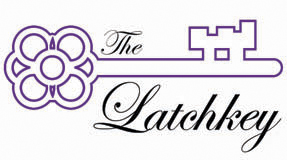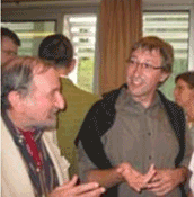Latchkey Home Book Reviews Essays Announcements Featured New Women
New Women: Who's Who GalleryThe Whine Cellar
Teaching Resources Bibliography
Contact us

|
|
ANNOUNCEMENTS
1. Review of the “Aesthetic Lives” Conference, Montpellier 23–24 September 2011
By Sally Newman
“Aesthetic Lives,” a two-day conference organised by Catherine Delyfer and Bénédicte Coste from Université Paul Valéry in Montpellier, brought together a diverse range of fascinating papers and scholars from around the globe. Whether it’s because it was held in late September with balmy, still-warm breezes drifting in from the Mediterranean, because of the friendly collegial community it inspired, or because of the delightful ambience of the ancient city of Montpellier, this conference is on my list of best conferences experiences.
The call for papers asked contributors to think about Aestheticism in its broadest sense as a widespread cultural movement which “enabled singular lifestyles to be born.” The focus on “issues of Aesthetic subjectivity, on the lived experience of Aesthetic individuality or difference, and on original trajectories in the context of Aesthetic practices” gave contributors a broad canvas with which to work. As the program attests, it also inspired some innovative interpretations of the key text which framed the conference, Walter Pater’s reflection on Hegel’s vision of the Greeks in The Renaissance: “They are great and free, and have grown up on the soil of their own individuality, creating themselves out of themselves, and moulding themselves to what they were, and willed to be.”
Keynotes by distinguished scholars Dennis Denisoff, “The Aesthetic Lives of Humans and Other Animals” (Ryerson University, Toronto) and Ana Parejo Vadillo, “Living Art: Michael Field and Aesthetic Dress” (Birkbeck, University of London), highlighted the debt we owe to the late nineteenth century in quite different ways. Each paper revealed the long history to the social progress movements that we view as unique to late modernity. Vadillo’s meticulous archival research on the history of Aesthetic dress shed new light on the relationship between clothing, fashion and the gendering of political and cultural movements, while Denisoff’s thoughtful paper challenged us to think about the “aesthetic lives of animals.”
Papers by Melissa Buron (Fine Arts Museum of San Francisco), examining “Wilde in San Francisco”; Wendy Parkin (University of Otago), on the celebrity of Jane Morris; Charlotte Ribeyrol (University of Paris IV), on Jane Ellen Harrison and the “Pausaniacs”; Stefano Evangelista (University of Oxford), on Ouida’s self-fashioning as “the last Greek”; and Lene Østermark-Johansen (University of Copenhagen) on “Paterian interiors” were only some of the highlights of this wonderful conference.
The prize for best quote of the conference goes to Jessica DeCoux (City University of New York Graduate Center) who likened her position as a scholar of Decadence at an Aestheticism conference to being the “sad step-child at a family gathering.” While provoking rueful laughter, Jessica highlighted the tremendous benefits of transnational gatherings such as “Aesthetic Lives” for enabling the exchange of ideas and academic cultures.
This conference is the second international conference organized by Catherine Delyfer and Bénédicte Coste, who are promising another in 2013 possibly on the topic of “Aesthetic Objects.” I can’t wait.
The conference website has the conference program and abstracts: http://www.esthetismes.org/
|
|
Dennis Denisoff, Morgan Holmes and
Wendy Parkins |
Julie Sauvage, Carmen Santiago, Charlotte Ribeyrol, Xavier Giudicelli, Anne-Florence Gillard-Estrada |
|
|
David Rose and Stefano Evangelista
|
Sally Newman and Stefano Evangelista |
|
|
Melissa Buron, Aurélie Petiot, Dennis Denisoff, Benedicte Coste and Catherine Delyfer |
Laurel Brake and Lene Østermark-Johansen |
Dr Sally Newman is a research fellow at Monash University, Melbourne. Her research is in the history of sexuality and emotion with a focus on the politics of deploying archival material as ‘evidence’ of identity in contemporary histories of female intimacy. Sally is currently working on the first critical edition of the literary correspondence between poet A. Mary F. Robinson (1857–1944), and intellectuals Vernon Lee (Violet Paget 1856–1935), and John A. Symonds (1840–1893), co-author with Havelock Ellis of Sexual Inversion (1897).
2. The BRANCH project
Dino Franco Felluga has recently undertaken a new publishing venture: Britain, Representation, and Nineteenth-Century History, 1775-1925, or BRANCH. It aspires to be a free, expansive, searchable, reliable, peer-reviewed, easy-to-use resource for the study of nineteenth-century history and culture, going beyond Wikipedia. Ultimately, the project aims at publishing 300+ articles organized by topic clusters and a timeline; new articles get published every week. You can find the website at http://www.branchcollective.org. As General Editor, Felluga welcomes input and feedback sent to felluga@purdue.edu.
3. New Resource for Olive Schreiner Research
Olive Schreiner Letters Online (www.oliveschreiner.org) stores about 4,800 letters written between 1871 and 1920, sorted both topic, dramatis personae (addressee or mentioned), and collection. (Thanks to Lena Wanggren, Research fellow at the University of Edinburgh, for her alert on the VICTORIA listserv).
4. Special Issue of Women’s Writing on Ella Hepworth Dixon
Women's Writing, Volume 19, Issue 1. Find out more at http://bit.ly/ellah-d. Besides an Introduction and several articles by notable scholars, the issue also contains two book reviews of recent books on Amy Levy (also see our own Featured New Women section on Levy)
5. Conference Announcement
Women’s Organisations and Female Activists in the Aftermath of the First World War: Moving Across Borders
“Recent developments in the social and cultural history of modern warfare have done much to shed new light on the experience of the First World War, and in particular how that experience was communicated in popular and high culture, and in acts of remembrance and commemoration after 1918. The post-war period (ca 1918-1923) is distinctive, both within individual nations and as a point of international comparison. It is characterised by the often troubled transition from a wartime to a peacetime society, continued conflicts over the repatriation of refugees and POWs; revolutionary and counter- revolutionary violence in parts of central Europe; and new ethnic and national conflicts arising from the collapse of the former Russian, German, Austro-Hungarian, and Ottoman empires, and the cultural anxieties that surrounded these events. Within this context, the role of organised women's movements and female activists in the post-war period takes on a new importance. The aim of this conference is to explore major comparative themes such as citizenship, suffrage, nationalism, and women's desire to respond to extremes of need in the post-war era (dislocation, internment, violence and hunger) from a national, international and transnational perspective. It will examine the work of organisations and individuals able to move across international borders, such as the Women’s International League for Peace and Freedom (WILPF) or the journalist Eleanor Franklin Egan, who reported on social conditions throughout post-war Europe. The role of such women and organisations in bringing about reconciliation and facilitating cooperation between former enemy nations (cultural demobilisation, ‘the dismantlement of the mindsets and values of wartime’—John Horne) will also be examined, as will the role of nationalist women's organisations in perpetuating discourses of war and in facilitating the rise of new forms of ethno-nationalism and racial intolerance (‘cultural remobilisation’) during the period 1918-1923.”
|






